Resources on Workplaces and Substance Use
Construction Industry
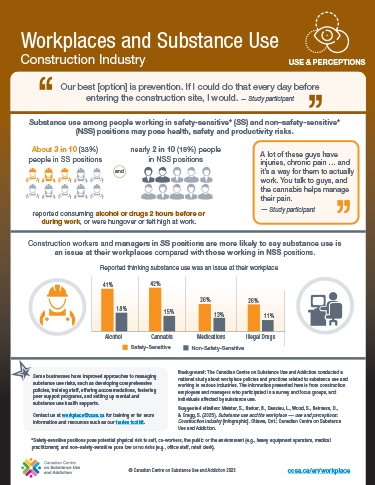
Workplaces and Substance Use: Construction Industry – Use and Perceptions
Illustrates key context and data on the use and perceptions of substance use in the construction...
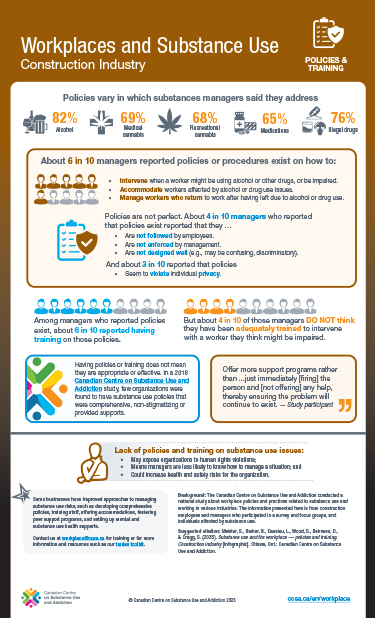
Workplaces and Substance Use: Construction Industry – Policies and Training
Illustrates key context and data on policies and training related to substance use in the...
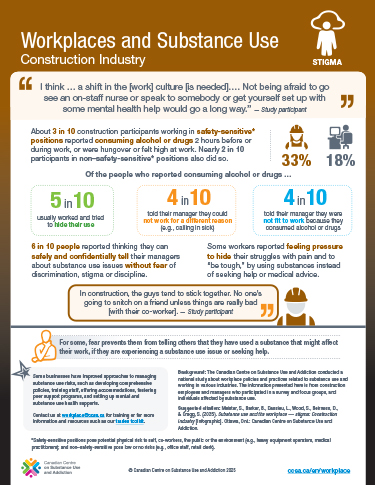
Workplaces and Substance Use: Construction Industry – Stigma
Illustrates key context and data on stigma related to substance use in the construction...
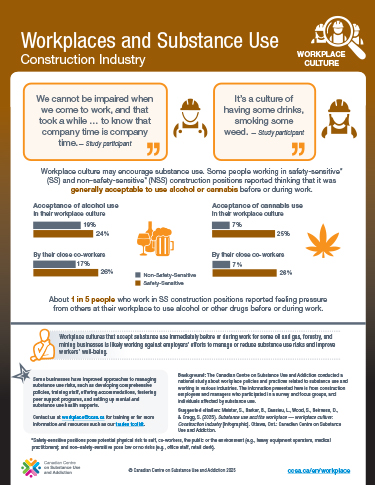
Workplaces and Substance Use: Construction Industry – Workplace Culture
Illustrates key context and data on workplace culture related to substance use in the...
Workplaces and Substance Use: Construction Industry
Provides key context, data, and recommendations on improving the substance use health of employees for employers and other partners (e.g., unions, associations, health...
Oil & Gas, Forestry, and Mining Industries
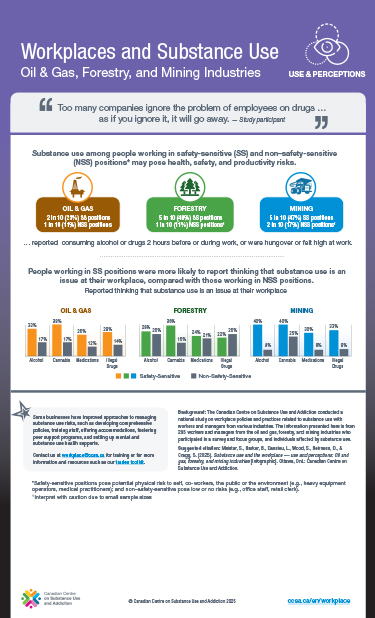
Workplaces and Substance Use: Oil & Gas, Forestry, and Mining Industries – Use and Perceptions
Illustrates key context and data on use and perceptions related to substance use in the oil and...
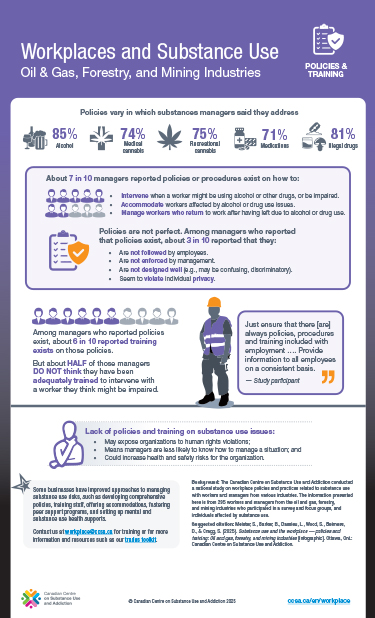
Workplaces and Substance Use: Oil & Gas, Forestry, and Mining Industries – Policies and Training
Illustrates key context and data on policies and training related to substance use in the oil...
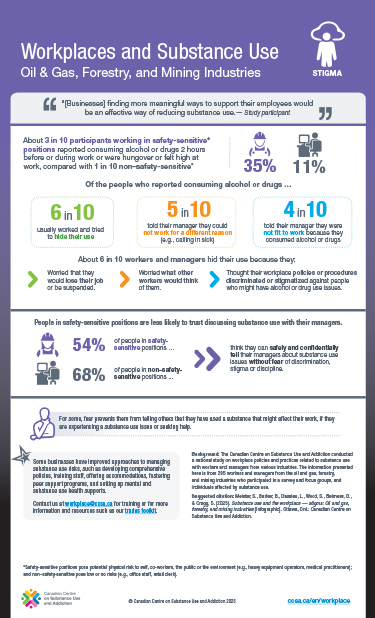
Workplaces and Substance Use: Oil & Gas, Forestry, and Mining Industries – Stigma
Illustrates key context and data on stigma related to substance use in the oil and gas,...
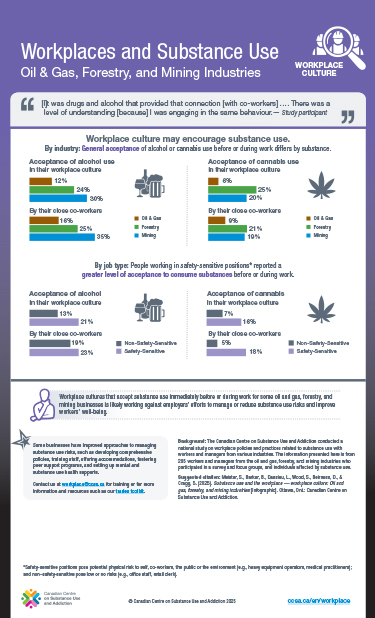
Workplaces and Substance Use: Oil & Gas, Forestry, and Mining Industries – Workplace Culture
Illustrates key context and data on workplace culture related to substance use in the oil and...
Workplaces and Substance Use: Forestry Industry
Provides key context, data, and recommendations on improving the substance use health of employees for employers and other partners (e.g., unions, associations, health...
Workplaces and Substance Use: Mining Industry
Provides key context, data, and recommendations on improving the substance use health of employees for employers and other partners (e.g., unions, associations, health...
Workplaces and Substance Use: Oil and Gas Industry
Provides key context, data, and recommendations on improving the substance use health of employees for employers and other partners (e.g., unions, associations, health...
Safety-Sensitive Positions
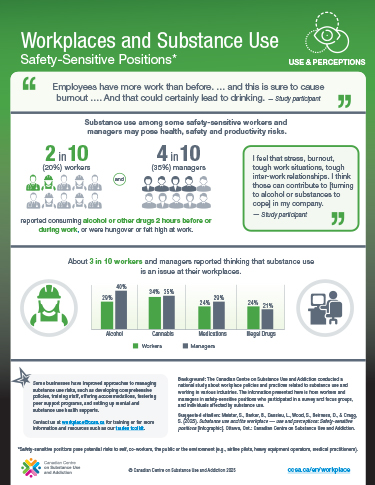
Workplaces and Substance Use: Safety-Sensitive Positions – Use and Perceptions
Illustrates key context and data on use and perception related to substance use by individuals...
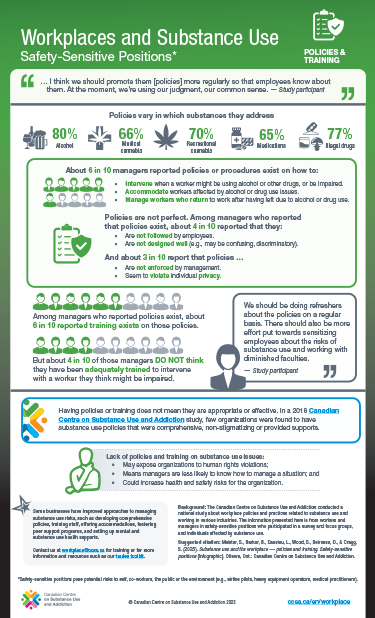
Workplaces and Substance Use: Safety-Sensitive Positions – Policies and Training
Illustrates key context and data on policies and training related to substance use by...
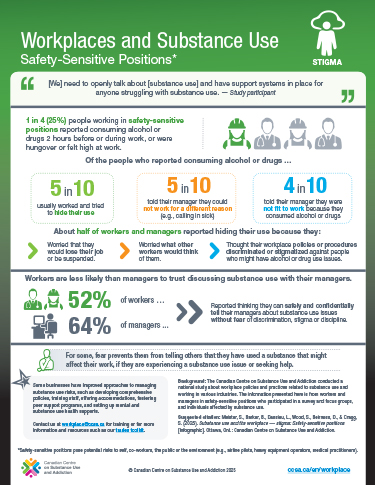
Workplaces and Substance Use: Safety-Sensitive Positions – Stigma
Illustrates key context and data on stigma related to substance use by individuals in...
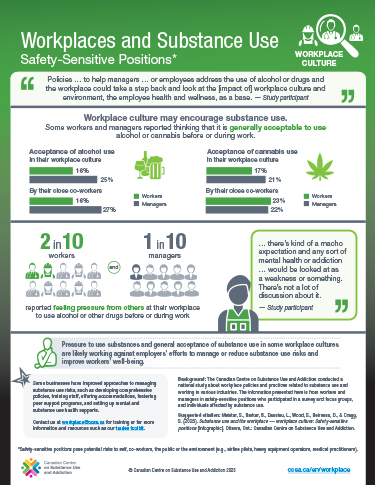
Workplaces and Substance Use: Safety-Sensitive Positions – Workplace Culture
Illustrates key context and data on workplace culture related to substance use by individuals in...
Workplaces and Substance Use: Safety-Sensitive Positions
Provides key context, data, and recommendations on improving the substance use health of...
Non–Safety-Sensitive Positions
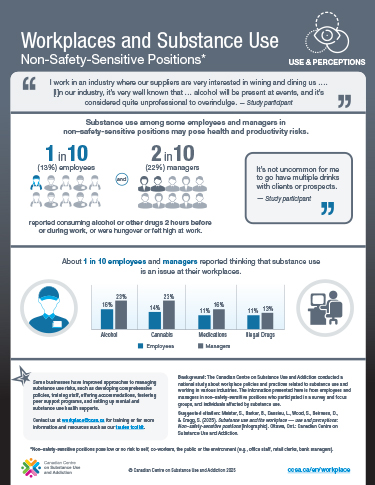
Workplaces and Substance Use: Non–Safety-Sensitive Positions – Use and Perceptions
Illustrates key context and data on use and perceptions related to substance use by individuals...
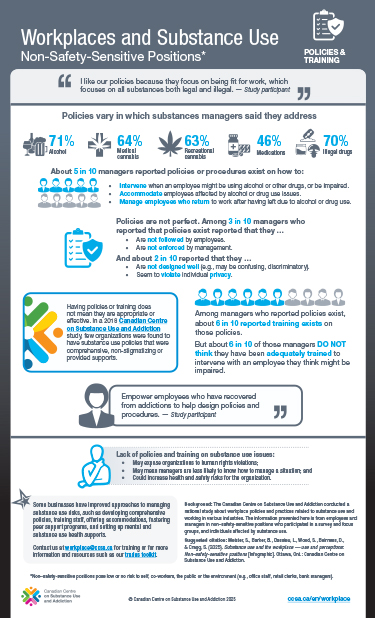
Workplaces and Substance Use: Non–Safety-Sensitive Positions – Policies and Training
Illustrates key context and data on policies and training related to substance use by...
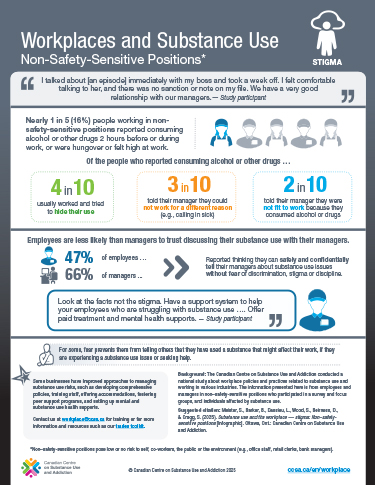
Workplaces and Substance Use: Non–Safety-Sensitive Positions – Stigma
Illustrates key context and data on policies and training related to substance use by...
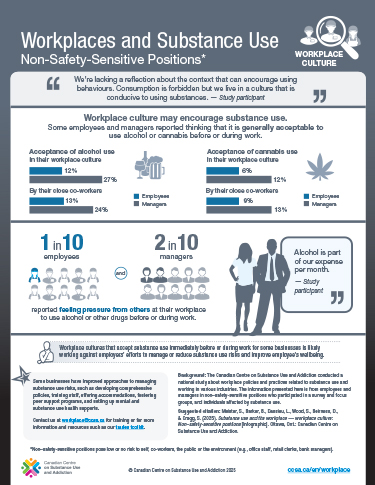
Workplaces and Substance Use: Non–Safety-Sensitive Positions – Workplace Culture
Illustrates key context and data on workplace culture related to substance use by individuals in...
Workplaces and Substance Use: Non-Safety-Sensitive Positions
Provides key context, data, and recommendations on improving the substance use health of...
Addressing Impairment and Substance Use in the Workplace
Substance use is not the only type of impairment (e.g., fatigue, stress, family crisis) that can affect the workplace. Employers typically do not receive nor should they be expected to receive training in recognizing the different types of impairment. While they should be prepared to observe and identify impairment, they should leave diagnoses up to professionals.
Using the proper resources to assist them, employers can help their staff deal with impairment in the workplace by developing comprehensive policies that focus on prevention and education, by reducing the stigma surrounding substance use and by improving employee supports.
The Canadian Substance Use Costs and Harms: 2007–2014 report estimates that lost productivity to businesses attributable to substance use in 2014 was $15.7 billion dollars. With the recent legalization of cannabis, many employers are re-examining their policies and best practices related to substance use and fitness for duty/impairment more broadly to ensure that they are comprehensive and effective.
To help employers, CCSA conducted a review of Canadian workplace policies and best practices to find out what employers were doing to address substance use and the workplace. Review key findings from the report or download the full report below.
Substance Use and the Workplace: Supporting Employers and Employees in the Trades
The Canadian Centre on Substance Use and Addiction partnered with Health Canada to produce Substance Use and the Workplace: Supporting Employers and Employees in the Trades, a collection of resources to help reduce the harms of substance use for Canadians, particularly those working in construction and the trades.
Targeting both employers and workers, the package includes information from more than 30 organizations to help:
• Educate employees about substances and their effects,
• Prevent substance use harms,
• Address employee substance use,
• Find services and supports, and
• Access related information from key reports and organizations.
To learn more about substances, please visit our opioids, alcohol, cannabis and stigma pages.
Substance Use on the Jobsite: Challenges and Support Measures
Created in partnership with the Canadian Centre for Occupational Health and Safety (CCOHS), this podcast explores the relationship between those working in the trades and substance use. Construction workers and those working in jobs with many physical demands may experience injury or chronic pain at a higher rate. Without proper guidance, those who use opioids or other substances to manage this pain may be at an increased risk of experiencing harms. Listen to the podcast conversation with CCSA experts to learn more about the use of opioids, cannabis and alcohol as it affects workers on the jobsite; the challenges around substance use faced by workers and employers; and how workplaces can support their employees’ health and safety.
Get to know our team of experts
François Gagnon, PhD
Senior Scientist and Special Policy Advisor
Area of Expertise:
- More Area of Expertise
Miguel Andres Hernandez-Basurto, MPH
Senior Knowledge Broker
Area of Expertise:
Katarina Kane, MSc
Research and Policy Analyst
Area of Expertise:
Pam Kent, PhD
Director, Research and Emerging Trends
Area of Expertise:
Samantha King, PhD
Research and Policy Analyst
Area of Expertise:
Christine Levesque, PhD
Research and Policy Analyst
Area of Expertise:
Heading
Contact an Expert
Latest CCSA Updates
The Canadian Centre on Substance Use and Addiction Welcomes Dr. Louis Francescutti, Neil Arao, Cheryl Fraser and Dr.…
The Canadian Centre on Substance Use and Addiction (CCSA) proudly welcomes Dr. Louis Francescutti, Neil Arao, Cheryl Fraser and Dr. Dirk Huyer to its Board of Directors. Dr.
The Canadian Centre on Substance Use and Addiction (CCSA) proudly welcomes Dr. Louis Francescutti, Neil Arao, Cheryl Fraser and Dr. Dirk Huyer to its Board of Directors. Dr.
Heading
Guidance, Tools and Resources
CCSA produces research-based publications, tools, and resources to support evidence-based decision-making on substance use health issues. Select your area of interest from the six categories below:
Heading
Substances
Delve into key resources on commonly used substances, such as alcohol, cannabis, opioids, stimulants and psychedelics. Learn about their effects, usage patterns, associated health and social consequences, and harm reduction considerations
Heading
Personal and Societal Impacts
Get insights on the personal and societal impacts of substance use and addiction , including gambling and impaired driving, and their effects on health, safety, and social well-being. Learn about effective prevention and harm-reduction strategies in various sectors.
Heading
Communities
Communities share common interests, values or goals, and interact with one another to build relationships and help networks. These materials support more inclusive, equitable, and community-informed responses to substance use and addiction. Dive into resources highlighting people with lived and living experience, stigma, sex- and gender-based analysis, Indigenous Peoples, and housing.
Heading
Treatment and Prevention
Explore medical, psychological, and social approaches aimed at helping individuals avoid or recover from substance use disorders. Get the facts on public health topics and learn about collaborative efforts to reduce stigma and promote more equitable, inclusive responses to substance use.
Heading
Youth
Learn about factors influencing substance use in young people, including childhood trauma and brain development, and get tools to support adult allies in leading meaningful, evidence-informed conversations with youth. Content promotes early prevention, harm reduction and supportive environments for youth up to age 25.
Heading
Substance Use and the Workplace
Substance use has a significant impact on the workplace, potentially affecting safety, productivity and employee well-being. Explore research on substance use in various industries. Resources support workplace leaders in building more supportive, stigma-free environments through practical strategies, improved approaches and initiative-taking education.
